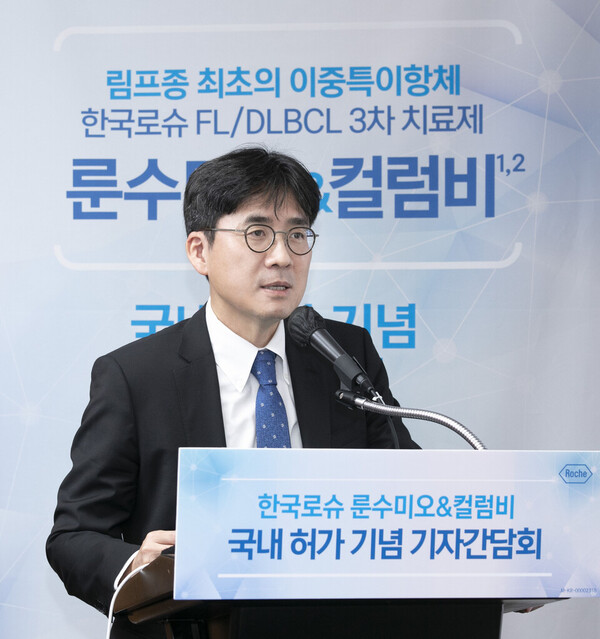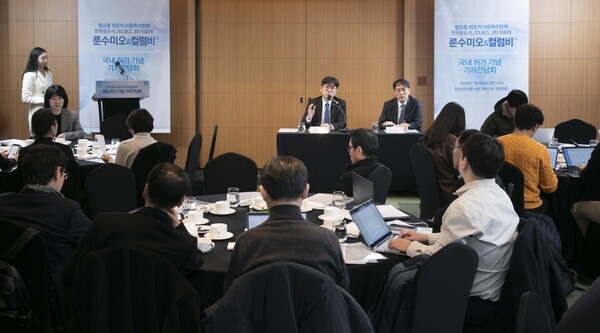The recent regulatory approval of bispecific antibodies Lunsumio (mosunetuzumab) and Columvi (glofitamab) in Korea has opened new treatment options for patients with relapsed lymphoma.
Attention is particularly on a possible rivalry between Roche’s Columvi and Novartis’ CAR-T therapy Kymriah (tisagenlecleucel).
Roche Korea held a press conference in southern Seoul on Wednesday to mark the winning of the approval for bispecific antibodies Lunsumio and Columvi.

At the event, Kim Seok-jin, a professor of hematology-oncology at Samsung Medical Center who will serve as the president of the Korean Society of Hematology from July, discussed the unmet needs and the latest licensed treatments in a talk titled, "Latest Treatment Strategies for Follicular Lymphoma (FL) and Diffuse Large B-Cell Lymphoma (DLBCL) in Stage III and Above.”
‘Lunsumio response rate encouraging compared to PI3K inhibitor Aliqopa’
Kim explained that follicular lymphoma (FL) is a type of non-Hodgkin's lymphoma, which used to have a low incidence in Korea, but has seen the largest increase in frequency over the past decade.
“We don't know the exact cause, but we speculate that it may be related to the westernization of lifestyle. Japan is showing a similar trend to ours," he said.
According to Kim, FL is marked by frequent relapses, and despite a gradual progression, the patient's quality of life may deteriorate. It has the potential to reoccur even a decade or more later.
Lunsumio stands out as a first-in-class CD20xCD3 T-cell engaging bispecific antibody designed for individuals experiencing relapsed or follicular lymphoma. Distinguishing itself from monoclonal antibodies, which typically target only one site, bispecific antibodies like Lunsumio feature an extra specific antigen binding site, resulting in enhanced specificity and targeting capabilities. Moreover, they demonstrate a reduced likelihood of side effects compared to conventional anticancer drugs.
The phase 1/2 study of Lunsumio, GO29781, which was the basis for the Korean approval, was conducted on 49 patients with relapsed or refractory FL who had received at least two prior therapies at 49 centers in seven countries, including Korea. Efficacy was evaluated in 90 patients and safety in 218 patients.
At one year and six months of treatment, the primary endpoint, complete response (CR), was 60 percent, and the secondary endpoint, overall response rate (ORR), was 80 percent.
Kim also highlighted that an independent review facility (IRF) evaluation showed a 14 percent higher CR rate for Lunsumio than patients treated with the PI3K inhibitor Aliqopa (copanlisib, Bayer).
Staying on lymphoma treatment is more important than a 'quick remission'
Kim said relapsed or refractory DLBCL is a curable disease.
However, when doctors prescribe “R-CHOP” combination therapy including MabThera (rituximab) for first-line treatment, about 60 percent of patients respond, and the rest 40 percent do not. Patients who relapse or are refractory to first-line treatment have a poor outcome, he added.
Kim also introduced results from the phase 1/2 study (NP30179), which supported the approval for Columvi. The study evaluated the clinical effectiveness and safety of Columvi in patients with relapsed or refractory DLBCL who had received at least two prior therapies.
Columvi’s CR rate, the primary endpoint, was 40 percent, and ORR, 52 percent.
“This trial involved patients who have undergone extensive prior therapies, with approximately one-third of participants having received prior CAR-T therapy,” Kim said.
The observed CR rate of less than 10 percent with traditional chemotherapy was notably low, and the latest outcomes were encouraging, he went on to say.
“It is significant to observe that certain subgroups of patients, including those who had previously undergone CAR-T therapy, exhibit a positive response,” he said.
He emphasized that lymphoma has a high rate of relapse, “so a brief, temporary remission is meaningless.”
“Given that many patients relapse repeatedly, treatment must be long-lasting,” he said.

The press conference continued with questions about the competitiveness of bispecific antibodies against CAR-T therapies such as Kymriah.
Kim said both modalities are complementary and beneficial to patients, so it's not a case of one being better or worse than the other.
Bispecific antibodies have the advantage of being off-the-shelf, but they require ongoing treatment, whereas CAR-T therapy has the advantage of being a “one-shot” treatment.
“After third-line or higher stage treatments, patients are free to choose either of them," he said.
In response to some critics who pointed out the lack of effectiveness of CAR-T therapies, Kim said, "If you ask about cost-effectiveness, that is also true for bispecific antibodies. You can't say that they are less expensive because they are administered more often."
"If you look at DLBCL alone, 60 percent of patients can get recovery on first-line treatment, but the other 40 percent cannot. If you take the number of patients who relapse at least once and put it out to 100, only 10 to 15 percent respond to conventional chemotherapy or a stem cell transplant. So the rest of the patients still have a poor prognosis, but if they can be saved by bispecific antibodies or CAR-T therapy, that's not a bad outcome at all."
Roche Korea ‘in talks with headquarters over early access program’
Roche Korea’s Access and Policy Head Choi In-hwa stressed that although the Korean government authorized Lunsumio and Columvi quickly through the “Global Innovative products on Fast Track” (GIFT) program, winning reimbursement was crucial to supply the new drugs to Korean patients.
“Korea ranks 13th in GDP in the world and spends 21 trillion won ($16 billion) on pharmaceuticals alone, yet the rate of reimbursement of innovative new drugs is low,” Choi said.
She went on to note that in late last year, the Ministry of Health and Welfare announced a plan for appropriate compensation for innovative new drugs.
Choi said she believed that Lunsumio and Columvi would qualify as innovative new drugs based on the incremental cost-effectiveness ratio (ICER), elasticity, and weighted average price preferences.
When asked if the company was considering ways to improve patient access before getting reimbursement, Shin Su-hee, Healthcare Innovation Cluster Lead at Roche Korea said, "The early access program (for Lunsumio and Columvi) is under discussion with our headquarters, so it's hard to comment on it right now."
Related articles
- Roche's double-antibody DLBCL treatment Columvi nabs Korean nod
- Roche’s follicular lymphoma drug, 1st to receive approval through fast-track program in Korea
- Roche Korea shares latest blood cancer treatment strategies using Columvi, Lunsumio
- ‘Domestic DLBCL secondary care landscape at its most vulnerable’

